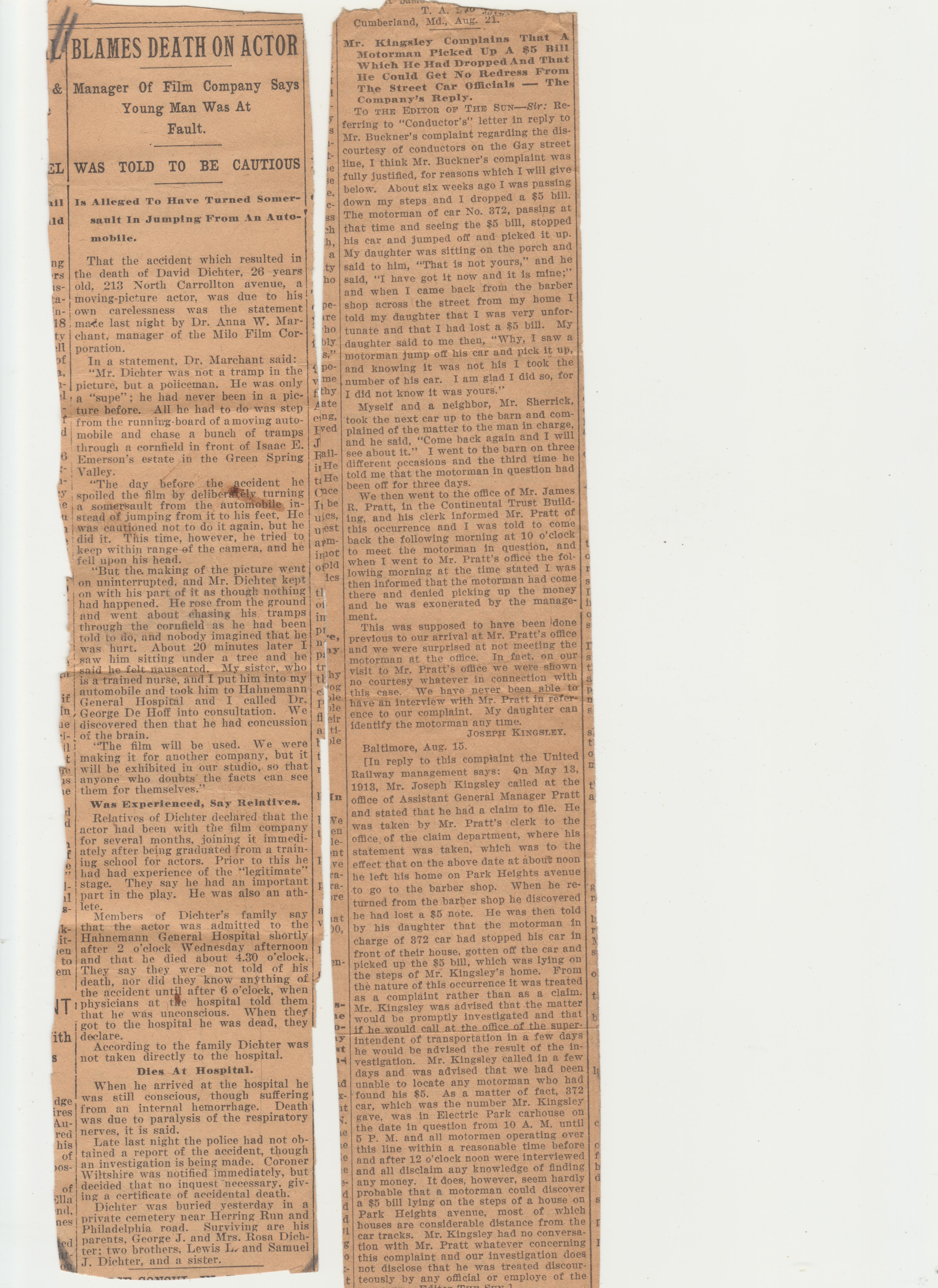Two News Cuttings (c.1913)
 These two vertically arranged and fragile-looking newspaper cuttings, pasted side by side on a scrapbook page, represent early 20th-century urban reporting from Baltimore and Cumberland, Maryland. They address two entirely unrelated but illustrative local incidents:
These two vertically arranged and fragile-looking newspaper cuttings, pasted side by side on a scrapbook page, represent early 20th-century urban reporting from Baltimore and Cumberland, Maryland. They address two entirely unrelated but illustrative local incidents:
LEFT COLUMN ARTICLE
Headline:
“Blames Death on Actor”
Subhead:
& Manager of Film Company Says Young Man Was At Fault
Context & Reasoning:
- A young man named David Dietert, aged 28, was killed after jumping from a moving automobile.
- He had been hired as a non-speaking “super” (extra) in a moving picture (film) by the Milo Film Corporation, which was apparently shooting in Green Spring Valley, Baltimore.
- His death prompted statements from both the film manager (blaming Dietert’s actions) and Dietert’s family, who insisted he was misled and exploited, and lacked experience in such roles.
- The case touches on early stunt safety and the use of non-professional actors in silent-era filmmaking.
- Additional details come from relatives and hospital reports, showing Dietert died of cerebral hemorrhage and respiratory failure following head trauma.
RIGHT COLUMN ARTICLE
Headline: (Not explicitly titled, but appears to be)
Mr. Kingsley Complains That Motorman Picked Up $5 Bill He Dropped
Context & Reasoning:
- Written as a letter to the editor by Joseph Kingsley of Cumberland, MD.
- Kingsley recounts an incident from May 13, 1913, where he accidentally dropped a $5 bill in front of a streetcar (No. 372) in Baltimore.
- He believes the motorman picked it up and failed to return it.
- Kingsley’s narrative is detailed and emotional, referencing his daughter as a witness, and his repeated attempts to report the incident to the United Railway Co. (the streetcar company).
- A response from the railway company is also included at the bottom, somewhat dismissing the complaint.
🧾 Overall theme:
An early 20th-century public accountability battle, rooted in class, transit access, and public trust, highlighting how a simple $5 dispute reflected larger frustrations with municipal services.
✍️ FULL TRANSCRIPTION BEGINS
LEFT COLUMN: “Blames Death on Actor”
BLAMES DEATH ON ACTOR
& Manager Of Film Company Says Young Man Was At Fault.
WAS TOLD TO BE CAUTIOUS
Is Alleged To Have Turned Somersault in Jumping From An Automobile.
That the accident which resulted in the death of David Dietert, 28 years old, 213 North Carrollton Avenue, a moving-picture actor, was due to the young man’s carelessness was the statement made last night by Dr. Ann W. Marchant, city manager of the Milo Film Corporation.
In a statement, Dr. Marchant said:
“Dietert was not a tramp in the picture, but a policeman. He was only a ‘super’; he had never been in a picture before. All he had to do was to jump from the running-board of a moving automobile and chase a band of tramps, who were concealed in front of Issac Emerson’s estate in the Green Spring Valley.
Two days before the accident spoiled the film by deliberately throwing himself from the automobile. He alighted unhurt and got a few fish, but refused to listen to cautions to be careful.
This time, however, he tried to do a “whirling leap” from the car while it was running and did a complete somersault in the air. His head struck the pavement. The picture was being taken, but it was cut off at the moment of the accident.”
Statements about this being an actual accident were false, she claimed.
“I have seen no such accident since 1895,” said Judge Harry Stockbridge, of the Supreme Bench, who is aiding Mr. George De Hoff in conducting the Memorial Hospital fund.
The film in question is titled “The Tramp Policeman” and is called by some the finest motion picture ever made in Baltimore.
“The film will be used,” Dr. Marchant said. “We were making it for another company, but if the owners do not use it, we will. With a few subtitles, the audience can see for themselves.”
Was Experienced, Say Relatives
Relatives of Dietert declared that he never had been told to jump from a moving automobile and that the film company had no right to use untrained actors in such dangerous stunts.
They stated that Dietert was not “green,” but had considerable stage and experience in legitimate drama. He was an “important actor” in the play, his family said.
Members of Dietert’s family admitted the actor was addicted to drink.
When doctors arrived at Maryland General Hospital Wednesday afternoon after 2 o’clock, they found Dietert still conscious. He said he had alighted from a streetcar and was going to work. He gave his address as 1706 Columbia Avenue and said he was going to the Palmer Hotel to work in the laundry.
According to the police who responded, the family of Dietert was not located until 9 o’clock.
Dies At Hospital.
When he arrived at the hospital he was conscious, but died the next day of cerebral hemorrhage. Death came from concussion of the brain and congestion of the respiratory centers.
Late last night the police had not obtained a list of the moving-picture actors who were in the automobile with Dietert. Dr. Marchant said they were mostly volunteers and had dispersed immediately after the accident.
The automobile was driven by a chauffeur hired from a livery stable, but police had not located him either.
Surviving are his parents, George and Maria Dietert, and several siblings, including Louis W. and Samuel J. Dietert, and a sister.
RIGHT COLUMN: Mr. Kingsley’s Complaint and Company’s Reply
Cumberland, Md., Aug. 14
Mr. Kingsley Complains That Motorman Picked Up A $5 Bill Which He Had Dropped And That He Could Get No Redress From The Street Car Officials — The Company’s Reply:
The Sun—Sir:
Referring to “Conductor’s” letter in reply to Mr. Buckner’s complaint regarding the discourtesy of conductors on the Gay street line, I think Mr. Buckner’s complaint was fully justified, for reasons which I will give below.
About six weeks ago I was passing from my home and dropped a $5 bill near the motorman of car No. 372, passing at the time and seeing the street, picked it up and disappeared.
My daughter was sitting on the porch and I said to him, “What did you pick up?”
He did not answer and put the money in his pocket. I had not left my home—only stood on the stoop of my house and saw the occurrence.
I said again: “Sir, I saw you pick up my money. That was $5 I lost.” My daughter said to me then, “Why, I saw a motorman jump off his car and pick it up, and knowing it was not his I told you.”
I took the number of his car. I ran and I did so for I did not know I was wrong.
Myself and a neighbor, Mr. Sherrick, took the next car up the same road, overtook and spoke to the man in charge.
I explained the circumstance and he smiled and said, “Come back again and bring a witness.”
I came back a third time in different positions and the third time he left the car the moment in question had been off the car three times.
We went to the office of Mr. James F. Pratt in the Continental Trust Building. After a long wait I was told to come back the following morning at 10 o’clock.
I went to Mr. Pratt’s office the following morning, and again waited. He then informed me that the motorman denied the whole thing and the money was gone.
This was supposed to have been done without witnesses or any redress. I asked that the motorman’s name be posted and denied service if he arrived.
In writing, Mr. Pratt stated in an interview with me: “Mr. Pratt is referring to your complaint. My daughter can identify the motorman any time.”
—Joseph Kingsley
Baltimore, Aug. 15
[In reply to above letter, the United Railway management says:]
On May 13, 1913, Mr. Joseph Kingsley called at the office of Assistant General Manager Pratt and stated that he had a claim to file.
He was taken by Mr. Pratt’s clerk to the office of the claim department, where his statement was taken, with a note that Mr. Pratt was not in.
He left his home on Park Heights Avenue to go to the barbershop. When he reached the shop he discovered he had lost a $5 note.
He was then told by his daughter that she had seen the motorman of car No. 372, then passing in front of the house, stoop and pick up a paper.
Mr. Kingsley declared that he thought the carman had taken the money, but could not describe the carman or the time.
Mr. Kingsley asked that the conductor of the car be expelled, but the company stated it could not proceed without proof.
(Rest slightly truncated, ends with a denial of complaint substantiation.)
